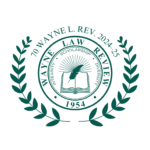Tag: Civil Procedure
Civil Procedure
Tricia L. Roelofs Read More …
Civil Procedure
Tricia L. Roelofs Read More …
Solving “the Burklow Problem”: Federal Question Jurisdiction of Tucker Act and Labor-Management Relations Act Cases After Textron Lycoming V. UAW
Jennifer E. Spreng & Roberto J. Escobar Read More …
